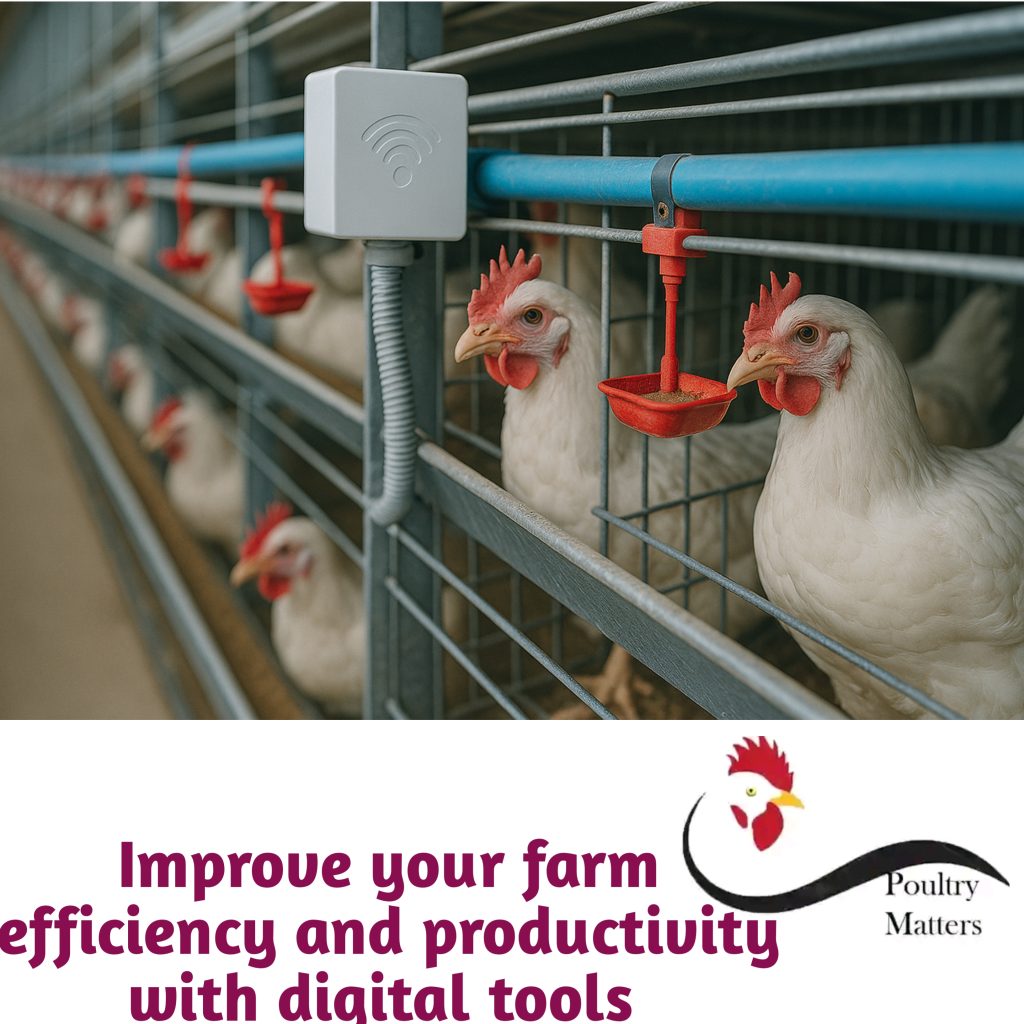Digital technologies and tools in poultry farming
In today’s fast-evolving agricultural landscape, the integration of digital technologies has become a game changer for poultry farmers seeking increased productivity, efficiency, and profitability from their farm operations.
Basically, digital technology refers to electronic tools, systems, and devices that generate, store, or process data. Examples include computers, smartphones, software applications, and the internet. Furthermore, digital tools are specific applications or platforms that help users perform tasks more efficiently using digital technology.
Incorporating digital technology in your poultry farm management offers innovative solutions that transform traditional farming methods into smart, data-driven practices. Here are five key areas in poultry farming management where digital technology can make signicant impact on your farm productivity –
Flock feeding – Automated feeders and smart sensors can monitor feed levels and control feeding schedules to reduce waste and ensure optimal nutrition.
Heath management – Digital tools like wearable sensors and mobile apps help track bird health, detect diseases early, and manage vaccination schedules.
Atmospheric temperature control – Smart systems (such as the smart ventilation system) regulate temperature, humidity, and ventilation in poultry houses. Consequently improving the welfare, comfort and productivity of the flock.
Record keeping and data management – Software and mobile apps can store data on birds’ growth, production, feed usage, and expenses for better decision-making.
Marketing and sales process – Social media platforms, websites, and e-commerce tools help farmers reach customers, promote their products, and manage sales online.
Benefits of digital technologies in your poultry operations
Incorporating digital technology into poultry farming is no longer a luxury — it is a necessity for farmers who want to stay competitive and efficient. From automating daily tasks to improving bird health and boosting profits, digital tools offer a wide range of advantages. Some of which include –
Improves efficiency of the farm operations –
Digital technologies streamline routine tasks such as feeding, watering, egg collection, and environmental control. With automated systems and smart sensors, farmers can save time, reduce manual labor, and ensure consistent care for the birds. This improved efficiency not only save cost and boosts productivity, it also allows farmers to focus more on strategic planning for business growth
Promote a more effective health management for the flock –
incorporating digital tools like sensors and health tracking software in the flock healthcare process enable proper monitoring of the bird bevaiour and early detection of illness. It also facilitates effective management of the flock’s vaccination schedules. These technologies help farmers respond quickly to health issues, reducing the risk of disease outbreaks and improving overall flock wellbeing. This proactive approach leads to healthier birds and better farm performance.
Promote valid and reliable record keeping –
Furthermore, digital technologies make it easier for poultry farmers to keep accurate and up-to-date records. With farm management software, example – PoultryPal, farmers can automatically track important data such as feed usage, egg production, vaccination schedules, and bird health. These digital records reduce human error, allow easy update, and safe data storage future reference. Reliable record keeping helps farmers make better decisions, monitor progress, and comply with regulations, leading to more efficient and profitable poultry farming operations.
Significantly reduce farm operational cost –
The smart systems in digital technologies helps the farmer minimize labour requirements and ensure efficient use of resources like feed, water, and electricity. Consequently reducing significantly overall cost expended on labour compensation and farm supplies.
Facilitate increased farm productivity –
Tools such as automated feeders, climate control systems, and smart sensors help farmers monitor and manage the farm operations more efficiently. Real-time data on temperature, humidity, feed levels, and bird health enables timely interventions, reducing losses and improving flock performance. With precision management and better resource utilization, farmers achieve higher output, lower costs, and improved overall productivity. Thereby, ensuring a more profitable and sustainable poultry business.
Support effective and efficient marketing process –
Digital technology enhances the marketing process in poultry farming by making it more effective and efficient. Through online platforms, social media, and e-commerce tools, farmers can reach a wider audience, promote their products, and receive direct orders from customers. Data analytics and customer feedback help farmers understand market trends, set competitive prices, and tailor their offerings to meet consumer demand. This digital approach reduces dependency on middlemen, increases profit margins, and ensures faster and more reliable delivery of products to the market.
Enhance right and smart decision process –
Also, digital technology empowers poultry farmers to make smarter and more accurate decisions. With access to real-time data on bird health, feed consumption, environmental conditions, and market prices, farmers can analyze trends and predict outcomes. Decision-support tools, mobile apps, and farm management software provide timely alerts and recommendations, helping farmers respond quickly to issues and optimize farm operations. This data-driven approach help farmer detect problems early, plan better strategies and minimizes risks. Therefore, leading to informed decision-making, improved productivity, increased profit margin and sustainability.
Conclusion –
Incorporating digital technologies in poultry farming is no longer a luxury — it is a necessity for modern, profitable, and sustainable agricultural practices. From enhancing farm productivity to supporting smart decision-making and streamlining the marketing process, digital tools are transforming the way poultry farmers operate. Embracing these innovations leads to improved efficiency, reduced losses, and greater competitiveness in today’s fast-evolving market.
Now is the time for your farm to step into the digital age. Whether you are running a small farm or managing a large operations, start exploring simple technologies that can automate tasks, track performance, and connect you with buyers. Invest in your digital knowledge, adopt relevant digital tools, and be part of the future of poultry farming—smart, efficient, and profitable.
Do you need any help – we are here for you.
Read more – https://poultrygist.com.ng/2025/01/key-poultry-farming-trends-to-note/

